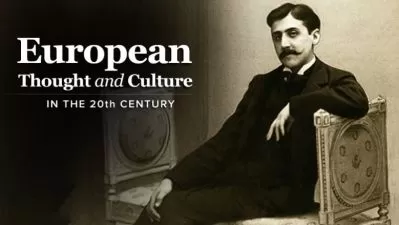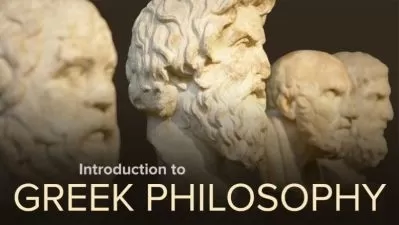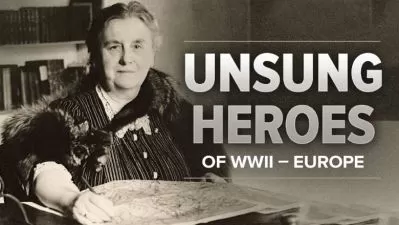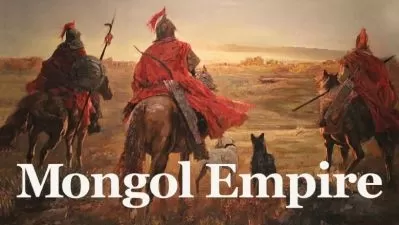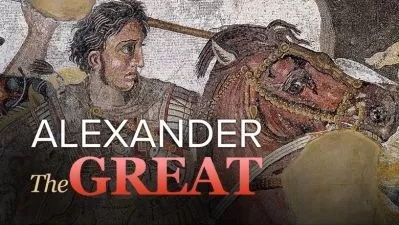Story of Medieval England: From King Arthur to the Tudor Conquest
Jennifer Paxton
19:05:40
Description
Evidence of Great Britain's legacy to the English-speaking world—indeed, to most of the Western world itself—is all around us, woven intimately into the fabric of almost every aspect of daily life. We see it in
- the laws and system of justice that help guide our behavior;
- the political principles that underpin our representative governments;
- the nature of those governments and their relationship to the governed;
- much of our most glorious literature and art; and
- our very language itself, from its most subtle meditations to its most powerful vulgarities.
But while many of us in search of the roots of this shared heritage often focus our attention on the contributions of modern Britain, the answers we seek are actually to be found much earlier.
For it is in the medieval history of England, Britain's most important realm, that our search must begin, from the withdrawal of Rome's legions to the beginning of the Tudor dynasty in 1485.
Even if you have a solid familiarity with medieval history as a whole, understanding the lessons of medieval England is essential to rounding out your knowledge of the period. Moreover, these lessons are a key to understanding much of the Western world that followed, including the social, political, and cultural legacies by which that world has been enriched.
The Story of Medieval England: From King Arthur to the Tudor Conquest tells the remarkable story of a tumultuous thousand-year period. Dominated by war, conquest, and the struggle to balance the stability brought by royal power with the rights of the governed, it was a period that put into place the foundation of much of the world we know today.
Taught by Professor Jennifer Paxton, an honored scholar and a professor at The Catholic University of America, The Story of Medieval England's 36 lectures feature a level of detail and attention to key figures that set this course apart from those with a more narrow focus.
Grasp the Emergence of the Themes that Shaped the Western World
As you journey through The Story of Medieval England's largely chronological narrative—occasionally interrupted for lecture-long explorations of specific topics—you'll see the course's key themes emerge. And as you do, Professor Paxton explains their impact and place in the larger historical picture:
- The long process of creating a unified English state by assimilating successive waves of ethnically diverse invaders, developing a particular sense of "Englishness,"and forging the growth of English nationalism
- The competition for power as different individuals struggled to establish rule and demonstrate the skills demanded of a king who would rule successfully
- The tense relationship between kings and the nobility, including changes in the nature of noble rebellion
- The role of the most persistent of those tensions—over money and taxation—in the creation and evolution of both the Magna Carta and Parliament
- How changes in economics, religion, law and justice, literacy, disease, and other factors affected everyday life for English people of all classes
And because so much of history is driven by specific individuals and not just historical circumstance, each lecture is rich in intimate portraits that reveal those individuals at the key moments of their historical destiny. Among the extraordinary figures you'll encounter are many who are undoubtedly familiar, including these:
- Alfred the Great, whose leadership against the Vikings, in the face of overwhelming military superiority, laid the foundation for what would become the first ruling house of a united England
- William the Conqueror, the extraordinary ruler whose name tells only part of the story, with his reign serving as a demonstration of how to truly consolidate and maintain power
- Eleanor of Aquitaine, the powerful French wife of King Henry II whose network of patrons fostered the spread of courtly literature and provided support for writers such as Chrétien de Troyes
- John Wycliffe, the Oxford cleric whose attacks on some of the core tenets of the Catholic Church contributed greatly to Protestant doctrine at the time of the Reformation.
Learn How History Can Be Shaped Even by Those in Its Shadows
But there are others, as well. You'll meet men and women visible to history only for what they represented as members of a group. These include people like the anonymous craftsman taking up arms in the Peasants' Revolt of 1381, enraged that the dramatically reduced work force left by the Black Death still could not command a living wage.
And you'll meet some who achieved fame chiefly among historians, like the Pastons. The story of this family's 15th-century rise from the yeomanry to the gentry bursts forth from the treasure trove of letters they shared for generations and that have survived to this day. As scholars have pored over them, a great amount of detail has emerged that gives us real insight into the achievements and hardship of these new practitioners of upward mobility.
The precious historical legacy represented by the Paston correspondence, however, represents only one of the ways in which Professor Paxton keeps the course vibrant and moving. Presenting her material in a cheerful and comfortable style, she continually unveils fresh perspectives on the lives of the men and women who determined England's history, from the wealthiest noble to the hardest-working serf.
She reads from Chaucer, reveals details from the unprecedented collection of information in what would become known as The Domesday Book, and leads you onto the bloody soil of some of history's most memorable battles—each time turning history into spellbinding narrative.
Medieval British History Made Crystal Clear
Just as important, she does it while making the meaning of each historical moment crystal clear, while also illuminating its role as part of a greater whole. Periodically, she pauses in the overall chronology to devote entire lectures to specific issues, such as Chaucer and the rise of English, or the evolution of knighthood and chivalry, so that your view of history's forest is never overwhelmed by your nearness to the trees.
The result is a course that winds up being not only informative but deeply entertaining, with each lecture drawing you in with its own particular fascinations, including
- a probing look at the scope of the Black Death and its social, economic, and religious implications, including its role in ultimately bringing about the Peasants' Revolt decades later;
- a realistic examination of the legends of both King Arthur and Robin Hood, revealing whether there is indeed a core of truth at the heart of the stories we have heard;
- a riveting description of the Battle of Bosworth Field, where the defeat of Richard III marked the beginning of the Tudor reign and ushered in a new age in English politics;
- an insightful look at the origins of the role of the coroner, and what an examination of early records of death can tell us about the ways in which English people lived during the late Middle Ages, and
- a discussion of the surprisingly nuanced penalties of the early Germanic law codes, which reveals the tremendous social complexity among the Germanic settlers in Britain in spite of the lack of any organized "state.”
Throughout The Story of Medieval England, including a tour de force final lecture in which she tightly weaves together the course's main themes and events, Professor Paxton consistently delivers a fresh level of understanding about medieval England, its rulers and subjects, and their significance for the world we live in today. The chain of theme and event that links our world to theirs will never be clearer, rewarding every moment you spend with this course.
More details
User Reviews
Rating
Jennifer Paxton
Instructor's CoursesJennifer Paxton is a Clinical Associate Professor of History at The Catholic University of America. She is also the Associate Dean of Undergraduate Studies and director of the University Honors Program. She was previously a Professorial Lecturer in History at Georgetown University, where she taught for more than a decade. Jennifer received her PhD in History from Harvard University, where she also taught and earned a Certificate of Distinction in Teaching. She is a widely published, award-winning writer and a highly regarded scholar, earning both a Mellon Fellowship in the Humanities and a Frank Knox Memorial Fellowship.
Jennifer lectures regularly at the Smithsonian Institution and serves as an expert on Scotland and Ireland for Smithsonian Journeys. Her research focuses on England from the reign of King Alfred to the late 12th century. She is particularly interested in the intersection between the authority of church and state and the representation of the past in historical texts, especially those produced by religious communities. She is completing a book that examines how monastic historians shaped their narratives to project present polemical concerns onto the past. She is also working on a project that examines changing views of abbatial leadership across the Anglo-Norman world in the 11th and 12th centuries.

The Great Courses
View courses The Great Courses- language english
- Training sessions 37
- duration 19:05:40
- English subtitles has
- Release Date 2023/06/07








